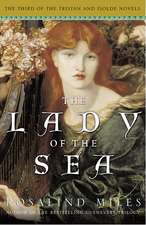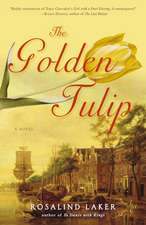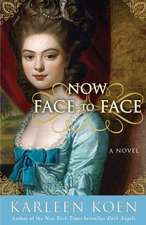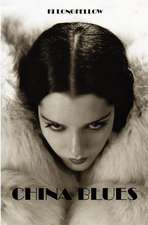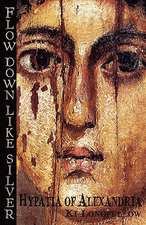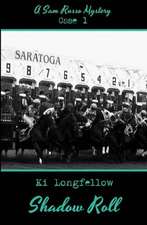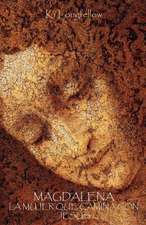The Secret Magdalene
Autor Ki Longfellowen Limba Engleză Paperback – 30 noi 2007
After seven years they return to a Judaea where many now believe John the Baptizer is the messiah. Salome too begins to believe, but Mariamne, now called Magdalene, is drawn to his cousin, Yeshu’a, a man touched by the divine in the same way she was during her days of illness. Together they speak of sharing their direct experience of God; but Yeshu’a unexpectedly gains a reputation as a healer, and as the ill and the troubled flock to him, he and Magdalene are forced to make a terrible decision.
This radical retelling of the greatest story ever told brings Mary Magdalene to life-not as a prostitute or demon-possessed-but as an educated woman who was truly the “apostle to the apostles.”
From the Hardcover edition.
Preț: 111.42 lei
Nou
Puncte Express: 167
Preț estimativ în valută:
21.33€ • 21.98$ • 18.00£
21.33€ • 21.98$ • 18.00£
Carte disponibilă
Livrare economică 10-24 februarie
Preluare comenzi: 021 569.72.76
Specificații
ISBN-13: 9780307346674
ISBN-10: 0307346676
Pagini: 434
Dimensiuni: 133 x 203 x 24 mm
Greutate: 0.34 kg
Ediția:Revised.
Editura: Three Rivers Press (CA)
ISBN-10: 0307346676
Pagini: 434
Dimensiuni: 133 x 203 x 24 mm
Greutate: 0.34 kg
Ediția:Revised.
Editura: Three Rivers Press (CA)
Extras
THE FIRST SCROLL
The Voice
Because I have recently been ill unto death, Tata has taken me to Temple this morning--but only me. Father does not know she does this. Salome does not know. We go alone so that Tata might offer a dove unto Asherah, the wife of Yahweh. Tata would thank Asherah for my life, for I have not died in my tenth year, though it seemed I might.
We are pushing our way through the Court of Women, Tata keeping a tight grip on my hand so that I do not stray from her side. But the dove in its wicker cage distracts her, and for this one moment, she has turned away from me. I have turned quite another way, pulling so that I might catch sight of the God of the Jews hiding in his Holy of Holies, and as I do, Tata is forced from her place by a Temple priest who would move past us, his face full flushed with pride of station. I know this man. His name is Ben Azar and he has eaten at Father's table many times. I do not like him. I do not like his eldest son. No matter that I have heard Father say I might wed this son of Ben Azar, I will not.
Tata's bird fights to be free of its cage and Tata fights to hold it. But I am turned full round to follow the progress of Father's friend, the Temple priest. He has gotten no farther than a press of men who look nothing like those who might eat at Father's table. Nor do they look like men of Jerusalem. They appear wild men who think wild thoughts, and I break away from Tata's hand that I might see them all the closer. Ben Azar is turning this way and that way to pass, but no matter which way he would go, there stands a man who blocks him, and as they do not move, he pushes at one who is nearest. But from this crowd of wild men comes now a very bull of a man, a man whose eyes burn like the sun at the end of the day. And in this man's hand there is a sica with a blade as curved as a smile. I would scream, I would warn Ben Azar even though I do not like him, I would call out to the Temple police. But a hand rough with toil is clamped over my mouth and I cannot call out. I can struggle against the grip that holds me fast, and I do struggle--though it avails me nothing. It avails Ben Azar nothing. I can only watch as the man like a bull thrusts his knife into Father's friend, not once, not twice, but thrice. Hot red blood splashes my feet; it spills on the golden tiles of the courtyard. Bright red blood fills the surprised mouth of Ben Azar, the Temple priest.
It is done. Ben Azar is dead on the courtyard tiles. And he who has held me fast lets loose his hand. I whirl in place so that I might see his face.
There are two who stand behind me.
As alike each to each as Jacob and Esau, these two, who are surely brothers, have hair and beards as red as a criminal's hair, as red as a magician's. There is no mercy in the eyes of one, but in the eyes of the other there is sadness and there is pity, but so too there is a fierce righteousness. There is also, I think, a terrible pain. As I stare up at these murderous twins, the man who has killed Ben Azar of the House of Boethus speaks out in the crude sounds of Galilee, "It is done, Yeshu'a." And the twin he calls Yeshu'a replies, "Yes, Simon Peter. Come away."
They are gone. And it seems no time has passed. And it seems no thing has happened, for only now does Tata succeed in caging her dove. And I would think I had dreamed this terrible deed save for the still body before me, and the blood on my feet, and the sudden sharp scream of a woman who has, only now, seen what others begin also to see.
Because it is my day of birth, Father allows me to dine this night at his table. How Roman of him! Even more exciting--how Greek!
Salome, who is also allowed, pretends she is not as excited as I am, does not think I notice the care she takes with her toilette or how cross she is with Tata and the other slaves who dress her hair. But I know my friend as I know myself. Is she not my father's ward and the sister of my heart? Dressing with more heed than ever I have, scenting even my feet with sweet oil--to dine at table is such an honor and so rarely conferred--I tell her that even though she has grown breasts, she may not act weary, weary, weary, as older women of our station do.
In return, she yawns.
But here we are, and there is Father laughing at something a guest is saying.
Neither Salome nor I have ever seen this man before--all oil and ooze, he names himself Ananias, and oh how he stinks. An Egyptian Jew, he claims to come from Alexandria, and when I hear this, I become all ears. There is nowhere so wonderful as Alexandria, unless it is Ephesus. He informs us he trades in the gold of Nubia and Parthia, and the precious balsam of Jericho, but that he relies most on his sponges. People will always buy a sponge.
Nicodemus of Bethphage is also at table. Being almost Father's equal in wealth, he is Father's oldest friend as well as a fellow member of the Sanhedrin, the Jewish governing body. Naomi, Father's new wife, is allowed this night at table too, though this I would rather forget.
As the men speak, I watch Ananias peeking at Salome's new breasts. Not that Father notices. Nor does Nicodemus. They are too caught up in food and wine and the talk of sponges and money. Salome even leans forward so that the merchant Ananias might fill his eyes with the shape of her "treasures." I am glad I have as yet no treasures. But if I did, I would not share them with such as Ananias. And if I did share them with such as Ananias, I would wait until they were bigger treasures. I tell Salome this in the secret code of eyes and mouths and hands we have used since I cannot remember when. She tells me he has brushed her bare skin twice now. I would laugh out loud if I could, but if I did, it would be a long time before we were allowed at table again. Besides, as ugly and as aged as he is, the merchant has been many places, done many things. He is an Alexandrian! There are so many ideas in Alexandria! Though I do love gods and though I love goddesses more, I love philosophy most. Tata says philosophy is religion without its clothes on.
I keep my nose covered with a scented cloth as I listen to the sponge merchant.
"I saw it with my own eyes," Ananias is saying in a voice a goat might use if a goat could speak. "I was right there at Temple, no more than ten cubits away when the priest was stabbed."
I sit very still. None here know that I too saw this killing. It is four days ago now, and still I see it. But I shall never tell of it, not even to Salome, for if any learn, Tata would face the lash for taking me to Temple to offer a dove to her forsaken Goddess Asherah, once wife of Yahweh.
"Whap! Whap! Whap! It was as quick as that. And there was the priest, dead as a dog in the street."
Nicodemus is silent, his mouth turned down in disgust. I can see him picturing Ben Azar as a dead dog in the street. "They are everywhere now, the Sicarii, these men with curved daggers."
"Everywhere?" asks Naomi through a mouthful of chewed cabbage. "Have the Romans crucified this one yet?"
"Crucified him, madam? They fail even to catch him."
Father's chest puffs with importance. "Oh, but they will. The Romans catch all assassins. Their crosses line the road to Joppa."
"Perhaps this one will too," says Ananias, "and perhaps not."
Father snorts. "Does this new brigand think himself Judas of Galilee? And if he does, did the corpse of Judas not stink as any other? I say to you, this one will also rot."
I grip the stem of my glass. Father mentions Judas of Galilee! Judas was a bandit chieftain. Tata has told Salome and me of the great revolt Judas led against the taxes of Rome in the very year I was born.
Ananias smiles at this. "You have heard, my friends, what the Poor say? You know the teaching of the mad Baptizer?"
"As a Sadducee, I do not listen," says Nicodemus, picking his back teeth. But then Nicodemus is always doing something revolting.
"Who are the Poor?" asks Naomi. "What is a mad baptizer?" As is usual with a woman, the men do not hear her.
Ananias answers himself, "They say that we live in the End Times."
"Nonsense," says Father.
"And that the world will soon cease to be."
"How soon?" asks Naomi. But her words are swallowed at a look from Father, who then has this to say, "So that is what the Poor and the Sicarii are doing? Bringing the world to an end one priest at a time?"
The merchant of sponges starts. "Hah! There is a thought, Josephus! There is a thought! I shall make it mine."
Salome and I look at each other and I am amazed at how high she can pull her eyebrows. Mine sit like mice over my eyes, afraid to move. Hers rise and fall on her face like the sun and the moon, make emphatic remarks like learned scribes.
Nicodemus sits like a stone, but Father laughs like a Greek, even as his fat guest is saying, "The Poor ask if we are God's Holy Nation, how is it we live as Greeks and submit to Romans? They answer we are subject to Rome because we sin. But they also say that there comes a messiah who will redeem Israel, endure the End Times, which shall destroy all others, and usher in the Kingdom of God." Ananias helps himself to the olives, pops one into his mouth, then another. "Some claim he brings a sword."
Father finds this wonderfully funny. "And what shall this messiah do with a sword?"
I find it hair-raising. How shall all others be destroyed?
Ananias pushes back from table. "I imagine he intends to smite those who do not put aside the ideas of the Greeks and the yoke of the Romans, and all those who break the Law. He will smite the Soferim, even the Sadducee."
Father waves away mention of the scrivening Soferim, but his laughter thins at the mention of the Sadducee. I tap Salome's leg with my toe. I am saying, By Isis, we are the others!
"He will smite the Sanhedrin and the high priestly houses of Ananus and Boethus. Indeed, has not someone already smote a member of the House of Boethus? They say all who betray the freedom of the Jews by preferring to be slaves to the Romans will know his hand."
All evening I have been marveling at Father's patience, but it is worn away now that this guest mentions the Sanhedrin, and now that he mentions Father's good friend, the new high priest, Josephus Caiaphas of the House of Ananus. But mostly it has vanished now that he mentions Rome. The new emperor Tiberius is not the old emperor Augustus. The Roman presence here is not as easy as it was, and it worsens. Father stares at the merchant of sponges with an eye as hard as a coin. "Is it not true that these same men preach that giving all one's worldly goods to the Poor is blessed in the eyes of the Lord?"
"It is," agrees a now more careful Ananias.
"And do they not mean themselves, and not the poor of the streets?"
"They do."
"Well, does it not then follow that if I should give all my worldly goods to the Poor, then it is I who should be poor? Will the Poor, now being rich, give me back all my goods? If this is so, how long will it go on, this passing back and forth of a man's possessions?"
Ananias has no answer, but Father has still a question.
"Would you agree that this sect, these Poor, also call themselves the Many?"
"Some do, Josephus, yes."
"In that case, there are two things to say about the Poor, also known as the Many. They are not many, and they are certainly not poor."
If I dared, I would laugh aloud. I do sneak an admiring look at Father, who rewards me with a tender smile. But Ananias has gotten the point and so changes the subject. "Tell me, Josephus, have you ever visited Megas of Ephesus?"
I practically jump out of my skin. He speaks of the most famous oracle, no, sorceress, from here to Antioch! She who is also a sacred harlot--a whore! He asks if Father would visit a whore. Yea Balaam! The mood, already grown grim, darkens like a stain. Last year Tiberius ran all the magicians out of Rome. These days, if he catches someone practicing magic, and if his mood is black, he orders them killed where they stand.
All await Father's answer. Salome signals me: Do not open your mouth, she is saying. Do not dare engage this oily old man in talk of Megas of Ephesus, no matter how much you would like to. And, oh, how I would like to--just as she would.
And though Ananias says what he pleases, he can see when what pleases him does not please others. "Accept my apologies, Josephus, for talking of such things."
Now it is Father who surprises us all. "No, no, I must know. What is she like, this one? Is she as beautiful as they say, and as powerful?"
Being half Father's size and having half Father's lung power, Nicodemus cannot restrain him. But he can search the stony faces of our slaves, trying to know if what occurs here will leave this room. He will fail, for this is not a gift Nicodemus possesses.
But I do.
Two men of the north stand like pillars behind Father. The German bears fruit and the Celt bears wine.
From the Hardcover edition.
The Voice
Because I have recently been ill unto death, Tata has taken me to Temple this morning--but only me. Father does not know she does this. Salome does not know. We go alone so that Tata might offer a dove unto Asherah, the wife of Yahweh. Tata would thank Asherah for my life, for I have not died in my tenth year, though it seemed I might.
We are pushing our way through the Court of Women, Tata keeping a tight grip on my hand so that I do not stray from her side. But the dove in its wicker cage distracts her, and for this one moment, she has turned away from me. I have turned quite another way, pulling so that I might catch sight of the God of the Jews hiding in his Holy of Holies, and as I do, Tata is forced from her place by a Temple priest who would move past us, his face full flushed with pride of station. I know this man. His name is Ben Azar and he has eaten at Father's table many times. I do not like him. I do not like his eldest son. No matter that I have heard Father say I might wed this son of Ben Azar, I will not.
Tata's bird fights to be free of its cage and Tata fights to hold it. But I am turned full round to follow the progress of Father's friend, the Temple priest. He has gotten no farther than a press of men who look nothing like those who might eat at Father's table. Nor do they look like men of Jerusalem. They appear wild men who think wild thoughts, and I break away from Tata's hand that I might see them all the closer. Ben Azar is turning this way and that way to pass, but no matter which way he would go, there stands a man who blocks him, and as they do not move, he pushes at one who is nearest. But from this crowd of wild men comes now a very bull of a man, a man whose eyes burn like the sun at the end of the day. And in this man's hand there is a sica with a blade as curved as a smile. I would scream, I would warn Ben Azar even though I do not like him, I would call out to the Temple police. But a hand rough with toil is clamped over my mouth and I cannot call out. I can struggle against the grip that holds me fast, and I do struggle--though it avails me nothing. It avails Ben Azar nothing. I can only watch as the man like a bull thrusts his knife into Father's friend, not once, not twice, but thrice. Hot red blood splashes my feet; it spills on the golden tiles of the courtyard. Bright red blood fills the surprised mouth of Ben Azar, the Temple priest.
It is done. Ben Azar is dead on the courtyard tiles. And he who has held me fast lets loose his hand. I whirl in place so that I might see his face.
There are two who stand behind me.
As alike each to each as Jacob and Esau, these two, who are surely brothers, have hair and beards as red as a criminal's hair, as red as a magician's. There is no mercy in the eyes of one, but in the eyes of the other there is sadness and there is pity, but so too there is a fierce righteousness. There is also, I think, a terrible pain. As I stare up at these murderous twins, the man who has killed Ben Azar of the House of Boethus speaks out in the crude sounds of Galilee, "It is done, Yeshu'a." And the twin he calls Yeshu'a replies, "Yes, Simon Peter. Come away."
They are gone. And it seems no time has passed. And it seems no thing has happened, for only now does Tata succeed in caging her dove. And I would think I had dreamed this terrible deed save for the still body before me, and the blood on my feet, and the sudden sharp scream of a woman who has, only now, seen what others begin also to see.
Because it is my day of birth, Father allows me to dine this night at his table. How Roman of him! Even more exciting--how Greek!
Salome, who is also allowed, pretends she is not as excited as I am, does not think I notice the care she takes with her toilette or how cross she is with Tata and the other slaves who dress her hair. But I know my friend as I know myself. Is she not my father's ward and the sister of my heart? Dressing with more heed than ever I have, scenting even my feet with sweet oil--to dine at table is such an honor and so rarely conferred--I tell her that even though she has grown breasts, she may not act weary, weary, weary, as older women of our station do.
In return, she yawns.
But here we are, and there is Father laughing at something a guest is saying.
Neither Salome nor I have ever seen this man before--all oil and ooze, he names himself Ananias, and oh how he stinks. An Egyptian Jew, he claims to come from Alexandria, and when I hear this, I become all ears. There is nowhere so wonderful as Alexandria, unless it is Ephesus. He informs us he trades in the gold of Nubia and Parthia, and the precious balsam of Jericho, but that he relies most on his sponges. People will always buy a sponge.
Nicodemus of Bethphage is also at table. Being almost Father's equal in wealth, he is Father's oldest friend as well as a fellow member of the Sanhedrin, the Jewish governing body. Naomi, Father's new wife, is allowed this night at table too, though this I would rather forget.
As the men speak, I watch Ananias peeking at Salome's new breasts. Not that Father notices. Nor does Nicodemus. They are too caught up in food and wine and the talk of sponges and money. Salome even leans forward so that the merchant Ananias might fill his eyes with the shape of her "treasures." I am glad I have as yet no treasures. But if I did, I would not share them with such as Ananias. And if I did share them with such as Ananias, I would wait until they were bigger treasures. I tell Salome this in the secret code of eyes and mouths and hands we have used since I cannot remember when. She tells me he has brushed her bare skin twice now. I would laugh out loud if I could, but if I did, it would be a long time before we were allowed at table again. Besides, as ugly and as aged as he is, the merchant has been many places, done many things. He is an Alexandrian! There are so many ideas in Alexandria! Though I do love gods and though I love goddesses more, I love philosophy most. Tata says philosophy is religion without its clothes on.
I keep my nose covered with a scented cloth as I listen to the sponge merchant.
"I saw it with my own eyes," Ananias is saying in a voice a goat might use if a goat could speak. "I was right there at Temple, no more than ten cubits away when the priest was stabbed."
I sit very still. None here know that I too saw this killing. It is four days ago now, and still I see it. But I shall never tell of it, not even to Salome, for if any learn, Tata would face the lash for taking me to Temple to offer a dove to her forsaken Goddess Asherah, once wife of Yahweh.
"Whap! Whap! Whap! It was as quick as that. And there was the priest, dead as a dog in the street."
Nicodemus is silent, his mouth turned down in disgust. I can see him picturing Ben Azar as a dead dog in the street. "They are everywhere now, the Sicarii, these men with curved daggers."
"Everywhere?" asks Naomi through a mouthful of chewed cabbage. "Have the Romans crucified this one yet?"
"Crucified him, madam? They fail even to catch him."
Father's chest puffs with importance. "Oh, but they will. The Romans catch all assassins. Their crosses line the road to Joppa."
"Perhaps this one will too," says Ananias, "and perhaps not."
Father snorts. "Does this new brigand think himself Judas of Galilee? And if he does, did the corpse of Judas not stink as any other? I say to you, this one will also rot."
I grip the stem of my glass. Father mentions Judas of Galilee! Judas was a bandit chieftain. Tata has told Salome and me of the great revolt Judas led against the taxes of Rome in the very year I was born.
Ananias smiles at this. "You have heard, my friends, what the Poor say? You know the teaching of the mad Baptizer?"
"As a Sadducee, I do not listen," says Nicodemus, picking his back teeth. But then Nicodemus is always doing something revolting.
"Who are the Poor?" asks Naomi. "What is a mad baptizer?" As is usual with a woman, the men do not hear her.
Ananias answers himself, "They say that we live in the End Times."
"Nonsense," says Father.
"And that the world will soon cease to be."
"How soon?" asks Naomi. But her words are swallowed at a look from Father, who then has this to say, "So that is what the Poor and the Sicarii are doing? Bringing the world to an end one priest at a time?"
The merchant of sponges starts. "Hah! There is a thought, Josephus! There is a thought! I shall make it mine."
Salome and I look at each other and I am amazed at how high she can pull her eyebrows. Mine sit like mice over my eyes, afraid to move. Hers rise and fall on her face like the sun and the moon, make emphatic remarks like learned scribes.
Nicodemus sits like a stone, but Father laughs like a Greek, even as his fat guest is saying, "The Poor ask if we are God's Holy Nation, how is it we live as Greeks and submit to Romans? They answer we are subject to Rome because we sin. But they also say that there comes a messiah who will redeem Israel, endure the End Times, which shall destroy all others, and usher in the Kingdom of God." Ananias helps himself to the olives, pops one into his mouth, then another. "Some claim he brings a sword."
Father finds this wonderfully funny. "And what shall this messiah do with a sword?"
I find it hair-raising. How shall all others be destroyed?
Ananias pushes back from table. "I imagine he intends to smite those who do not put aside the ideas of the Greeks and the yoke of the Romans, and all those who break the Law. He will smite the Soferim, even the Sadducee."
Father waves away mention of the scrivening Soferim, but his laughter thins at the mention of the Sadducee. I tap Salome's leg with my toe. I am saying, By Isis, we are the others!
"He will smite the Sanhedrin and the high priestly houses of Ananus and Boethus. Indeed, has not someone already smote a member of the House of Boethus? They say all who betray the freedom of the Jews by preferring to be slaves to the Romans will know his hand."
All evening I have been marveling at Father's patience, but it is worn away now that this guest mentions the Sanhedrin, and now that he mentions Father's good friend, the new high priest, Josephus Caiaphas of the House of Ananus. But mostly it has vanished now that he mentions Rome. The new emperor Tiberius is not the old emperor Augustus. The Roman presence here is not as easy as it was, and it worsens. Father stares at the merchant of sponges with an eye as hard as a coin. "Is it not true that these same men preach that giving all one's worldly goods to the Poor is blessed in the eyes of the Lord?"
"It is," agrees a now more careful Ananias.
"And do they not mean themselves, and not the poor of the streets?"
"They do."
"Well, does it not then follow that if I should give all my worldly goods to the Poor, then it is I who should be poor? Will the Poor, now being rich, give me back all my goods? If this is so, how long will it go on, this passing back and forth of a man's possessions?"
Ananias has no answer, but Father has still a question.
"Would you agree that this sect, these Poor, also call themselves the Many?"
"Some do, Josephus, yes."
"In that case, there are two things to say about the Poor, also known as the Many. They are not many, and they are certainly not poor."
If I dared, I would laugh aloud. I do sneak an admiring look at Father, who rewards me with a tender smile. But Ananias has gotten the point and so changes the subject. "Tell me, Josephus, have you ever visited Megas of Ephesus?"
I practically jump out of my skin. He speaks of the most famous oracle, no, sorceress, from here to Antioch! She who is also a sacred harlot--a whore! He asks if Father would visit a whore. Yea Balaam! The mood, already grown grim, darkens like a stain. Last year Tiberius ran all the magicians out of Rome. These days, if he catches someone practicing magic, and if his mood is black, he orders them killed where they stand.
All await Father's answer. Salome signals me: Do not open your mouth, she is saying. Do not dare engage this oily old man in talk of Megas of Ephesus, no matter how much you would like to. And, oh, how I would like to--just as she would.
And though Ananias says what he pleases, he can see when what pleases him does not please others. "Accept my apologies, Josephus, for talking of such things."
Now it is Father who surprises us all. "No, no, I must know. What is she like, this one? Is she as beautiful as they say, and as powerful?"
Being half Father's size and having half Father's lung power, Nicodemus cannot restrain him. But he can search the stony faces of our slaves, trying to know if what occurs here will leave this room. He will fail, for this is not a gift Nicodemus possesses.
But I do.
Two men of the north stand like pillars behind Father. The German bears fruit and the Celt bears wine.
From the Hardcover edition.
Recenzii
“Highly original and highly engaging, The Secret Magdalene is a sweeping yet intimate tale, an emotional and intellectual journey that questions everything, including the real nature of Jesus.” –India Edghill, author of Wisdom’s Daughter
“In The Secret Magdalene Ki Longfellow portrays Jesus and Mary Magdalene of the Gnostic Gospel tradition-two great teachers whose friendship blossoms within the political turmoil of first century Palestine. What The DaVinci Code only hinted at, Longfellow brings to life.” –Rebecca Kohn, author of The Gilded Chamber
“Imaginative, well-researched, and full of profound wisdom, this wonderful novel brings the ancient world to life.” –Timothy Freke, co author of The Laughing Jesus
“Superb characterization, a brilliant visual palette, and thorough scholarship. One feels the stone streets of Jerusalem, breathes the air by the stinking salt sea . . . Ki Longfellow’s Mariamne will no doubt eclipse all other representations of Mary Magdalene for some time. The Secret Magdalene is both heartbreaking and inspiring.” –Earl Doherty, author of The Jesus Puzzle
“A beautifully written book, immaculately researched. It moved me to tears . . . I felt if this is not how it was, it is certainly how it should have been.” –BookCrossing.com
From the Hardcover edition.
“In The Secret Magdalene Ki Longfellow portrays Jesus and Mary Magdalene of the Gnostic Gospel tradition-two great teachers whose friendship blossoms within the political turmoil of first century Palestine. What The DaVinci Code only hinted at, Longfellow brings to life.” –Rebecca Kohn, author of The Gilded Chamber
“Imaginative, well-researched, and full of profound wisdom, this wonderful novel brings the ancient world to life.” –Timothy Freke, co author of The Laughing Jesus
“Superb characterization, a brilliant visual palette, and thorough scholarship. One feels the stone streets of Jerusalem, breathes the air by the stinking salt sea . . . Ki Longfellow’s Mariamne will no doubt eclipse all other representations of Mary Magdalene for some time. The Secret Magdalene is both heartbreaking and inspiring.” –Earl Doherty, author of The Jesus Puzzle
“A beautifully written book, immaculately researched. It moved me to tears . . . I felt if this is not how it was, it is certainly how it should have been.” –BookCrossing.com
From the Hardcover edition.
Descriere
This radical retelling of the greatest story ever told brings Mary Magdalene to life--not as a prostitute or demon-possessed but as an educated woman who was truly the "apostle to the apostles."
Notă biografică
Ki Longfellow is the author of China Blues, Chasing Women, and The Secret Magdalene. She lives in Vermont.


